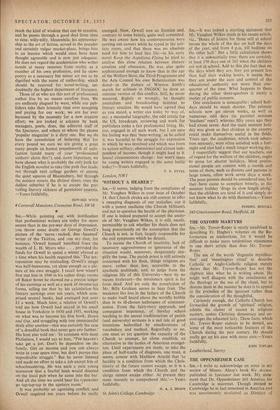SIR,—While pointing out with justification that professional writers are today
far more secure than in the pre-war days of depression, you throw some doubt on George Orwell's picture of the 'nerve - racked, dun - haunted' writer of the Thirties, and you say that, for instance, 'Orwell himself benefited from the wealth of L. H. Myers who . . . provided the funds for Orwell to spend a winter abroad at a time when his health required this.' The jux- taposition may be misleading. Orwell's image was half-humorous, yet close enough as a pic- ture of his own struggle. I recall how whenol first met him in 1940 in his rather dingy rooms off Baker Street he showed me a precise ledger of his earnings as well as a stack of income tax forms, telling me that by his calculation his literary earnings over ten years, which com- prised several books, had averaged just over £3 a week. Much later, a relative of Orwell's told me how Orwell had stayed in his small house in Yorkshire in 1930 and 1931, working on what was to become his first book, Down and Out, and struggling with one unsuccessful draft after another—this was certainly the case of 'a dreadful book that never gets any farther.' His host also told me : 'In common with most Philistines, I would say to him, "For heaven's sake get a job. Don't be dependent on the family. Get an income and you can always write in your spare time, but don't pursue this unprofitable struggle." But he never listened and made no effort to take a job except bits of schoolmastering. He was such a pale young scarecrow that a fearful hush would descend on the local pub when he came into the bar. And all the time we could hear his typewriter go tap-tap-tap in the upstairs room.'
It was probably an agonising conflict, and Orwell required ten years before he really
emerged. Now, Orwell was an Etonian and, contrary to some beliefs, quite well connected. He was aware how his contemporaries were carving out careers while he typed in the soli- tary room, and that there was no absolute need for him to lead this life—in his early novel Keep the Aspidistra Flying he tried to analyse this close relation between literary creation and obsession. He was also quite sophisticated enough to know that in the age of the Welfare State, the Third Programme and the Arts Council his own Bohemianism was dated—in the picture of Winston Smith's search for solitude in INGSOC he drew an extreme version of this conflict. Still, he never wavered. Rightly or wrongly, he thought journalism and broadcasting inimical to literary creation. He would have agreed that as you stated, a writer can today by way of, say, a successful biography, the odd article for the US, broadcasts, reviewing and work for publishers make a fair professional living. He, too, engaged in all such work, but I am sure his feeling was that 'near-writing,' as he called it, was harmful to the struggle for expression in which he was involved and which was from its nature solitary, obsessional and almost inde- pendent of income, though it might lead to it. Social circumstances change: but won't there be young writers engaged in the same battle today'?—Yours faithfully,
T. R. FYVEL London, NW I


































 Previous page
Previous page